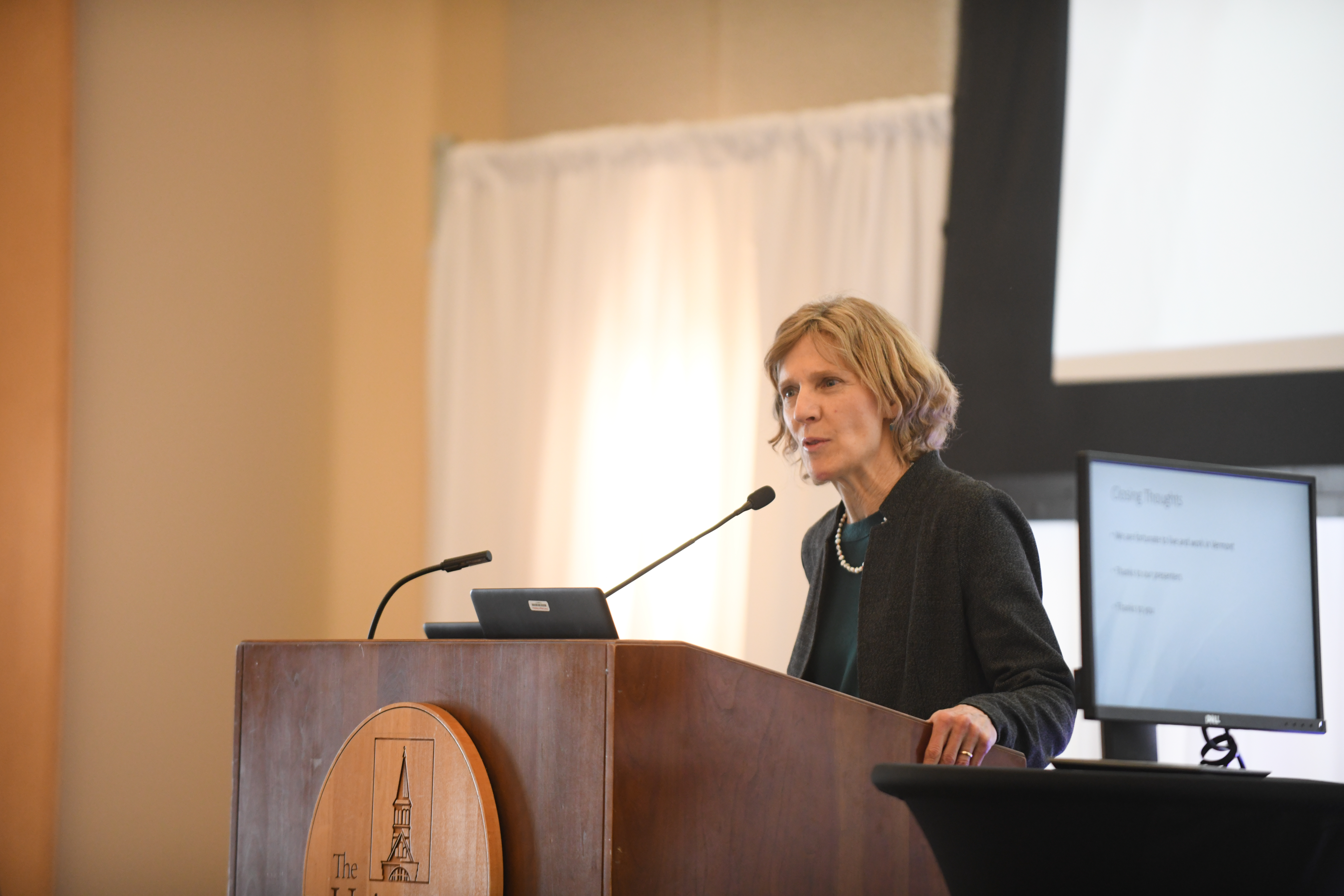The 18th annual Cultural Awareness Conference at the University of Vermont on February 20, 2019 focused on “Opioid Use Disorder: What is Our Role in Building a Humanistic Response?”

Martha Seagrave, PA-C, R.N., associate professor and director of medical student education programs in the Department of Family Medicine, speaks at the 18th Annual Cultural Awareness Conference
"Opioid Use Disorder: What is Our Role in Building a Humanistic Response?” On February 20, attendees at the annual Cultural Awareness Conference at the University of Vermont asked themselves this key question repeatedly throughout the half-day event.
Now in its 18th year, the conference initially served just a small group of family medicine residents. In 2011, Martha Seagrave, PA-C, R.N., associate professor and director of medical student education programs in the Department of Family Medicine, re-imagined the conference and received a five-year grant from the Health Resources and Services Administration to launch a new curriculum that would “progressively introduce medical students to the concepts, language, and integration of knowledge, skills and attitudes central to the Patient-Centered Medical Home concept.” The conference became one piece of a larger, innovative program, called TOPMEd, that is still a part of the Vermont Integrated Curriculum medical students at the Larner College of Medicine experience today.
By 2017, when the grant ended, Seagrave and her team had built a sustainable program and created partnerships with the College’s Office of Diversity and Inclusion, the Office of Primary Care, and the Department of Family Medicine to ensure the longevity of the conference.
Currently, the conference is a required curricular event for first-year medical students at the College, as well as advanced practice nursing students in the College of Nursing and Health Sciences, and pharmacy students from the Albany College of Pharmacy and Health Sciences' Colchester, Vt. campus. The interdisciplinary mix of students meets one of the key goals of the conference – to provide an interprofessional learning opportunity for students to foster an understanding of the importance of interdisciplinary teamwork in medicine and, in turn, help them become better clinicians.
This major takeaway was not lost on Richard Brach, a medical student in the Class of 2022. “Medicine…has a tendency to silo people in their respective specialties because they become experts in a particular field,” he said. “This can make working together to address interdisciplinary problems like the opioid epidemic especially difficult because people need to leave their comfort zone in order to discuss multidisciplinary solutions that they are not experts on.”
In addition to fostering an interdisciplinary approach to clinical problem-solving, the conference always seeks to highlight a timely cultural issue that students will likely encounter not only during their education but as physicians, nurses, and pharmacists as well. This year’s topic “was a no-brainer,” said Seagrave. Brach, who helped Seagrave and the conference’s committee with planning in his role as a member of the College’s Social Justice Coalition agreed. “…We’re in the midst of the opioid epidemic and still in dire need of humane solutions,” he said. “The theme was perfect.”
Throughout the day, students listened to community members and representatives from organizations such as the Howard Center, Turning Point Center of Chittenden County, Vermont CARES, the Burlington Police Department, State of Vermont Hub and Spoke, and more. While listening to the presentations and panels, students were asked to reflect on and discuss their own experiences and biases in relation to opioids and people who use them, identify the intersection of social determinants of health and opioid use and misuse, articulate public and population health implications of opioid use, compare and contrast harm reduction approaches and strategies related to reducing risk for people who use drugs, and advocate for a human-centered approach to care delivery for individuals in relation to opioids.
Both Brach and his classmate, Alim Esemenli, agreed that the conference was essential and an impactful learning opportunity for them and their classmates. “Sometimes…we can forget the reason why we are here,” said Esemenli. “At the end of the day, the goal is to become a physician who is culturally competent, up to date on issues dealing with social justice, capable of understanding and approaching stigma and bias, and able empathize with and care for patients from all sorts of backgrounds and experiences without judgement and/or fear.”
--------------
Additional information & resources:
View the speaker profiles from this year's conference here.
View conference topics from 2012 - 2019 here.
Original article about initial HRSA Grant - October 19, 2011